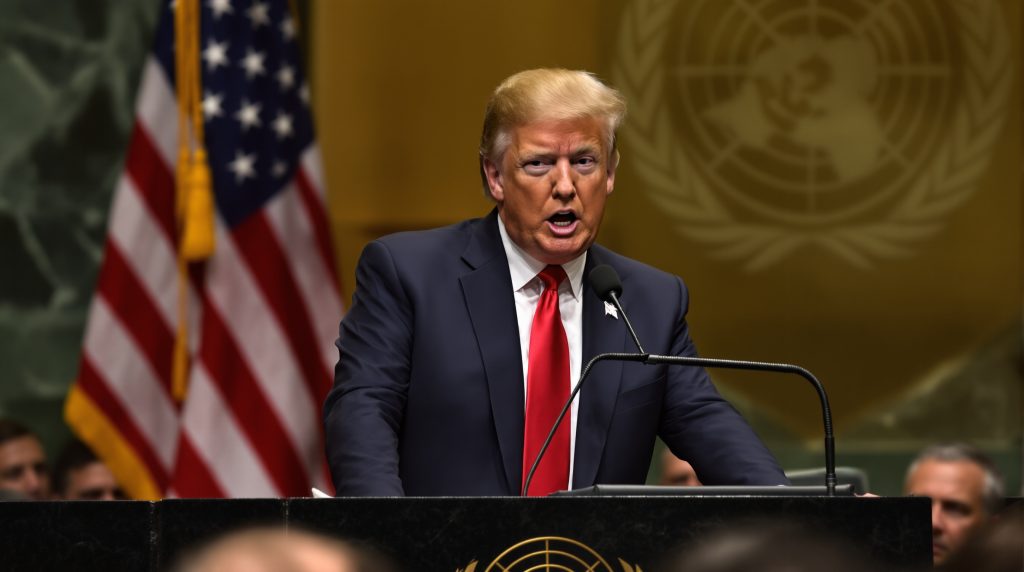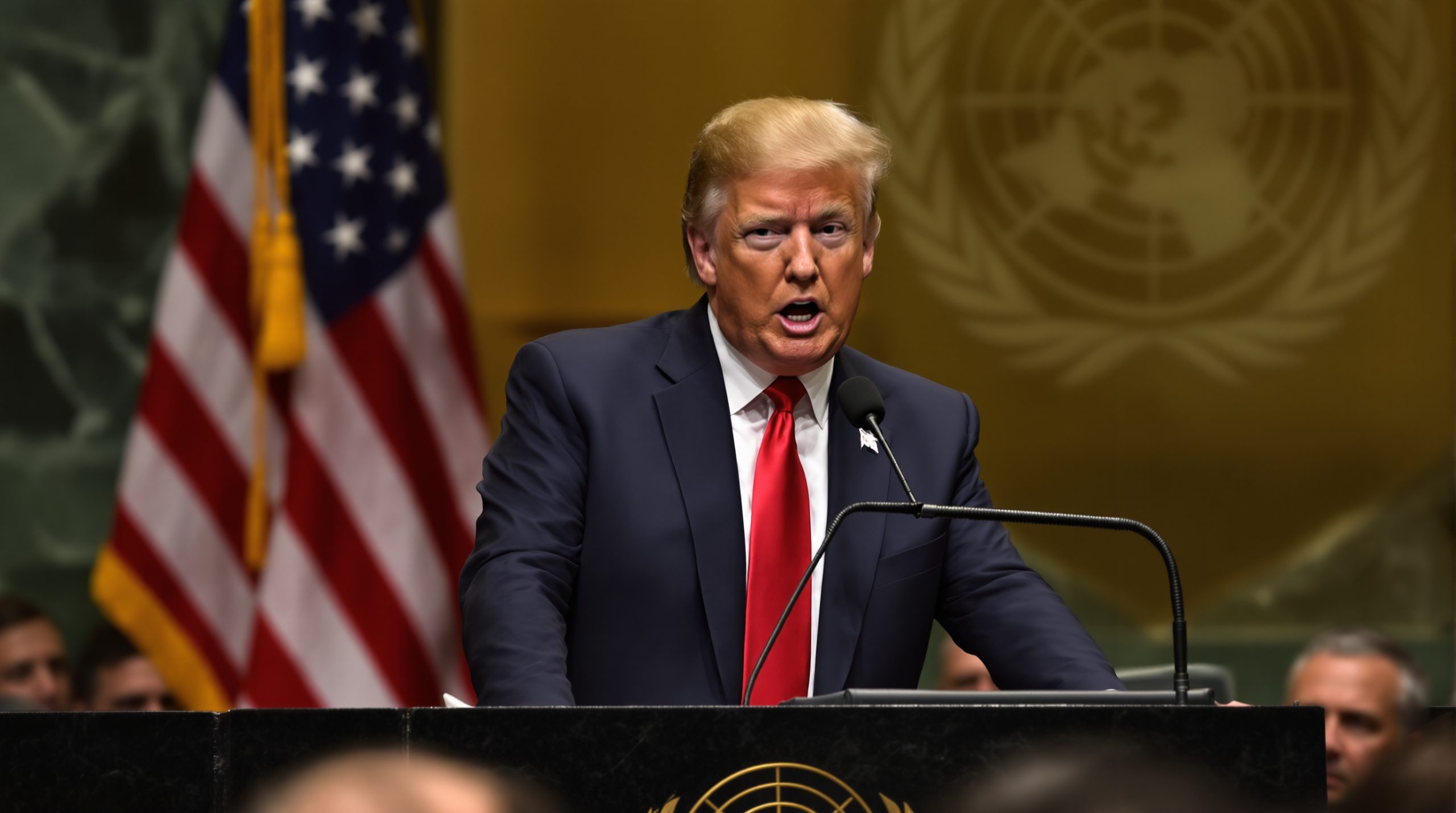Trump's UN Speech: Challenging the Global Order with "America First"
President Trump's appearance at the 80th session of the United Nations General Assembly marked a watershed moment in American diplomatic positioning. His address presented a fundamentally different vision for America's role in global affairs, prioritizing national sovereignty over multilateral cooperation in ways that startled many diplomatic observers. The speech, where Trump declares war on the world at UN, represented a dramatic shift in American foreign policy rhetoric.
The Essence of Trump's Nationalist Vision
Trump articulated a worldview where:
- National interests take precedence over global governance structures
- Sovereign decision-making trumps international consensus-building
- American economic and military power operates with minimal external constraints
- International institutions serve American interests rather than shaping them
This framework represents a significant departure from post-World War II American diplomatic traditions that have generally championed international institutions and collective security arrangements. His approach threatens to intensify the existing US‑China trade war impact on global markets.
What Criticisms Did Trump Level Against International Institutions?
The president's assessment of the United Nations and other international bodies was notably harsh, focusing on perceived institutional failures.
Questioning the UN's Core Mission and Effectiveness
Trump characterized international organizations as:
- Failing to prevent conflicts despite substantial funding
- Creating dependency rather than fostering independence
- Misallocating resources toward ineffective programs
- Undermining national sovereignty through overreaching mandates
Financial Accountability Concerns
His economic critique centered on:
- Disproportionate American financial contributions relative to benefits received
- Lack of fiscal discipline within international organizations
- Questionable allocation of humanitarian resources
- Insufficient burden-sharing among member states
Trump's criticism aligns with his broader economic strategy, including his recent Trump critical minerals order that emphasizes American resource independence.
How Did Trump Address Major Global Conflicts?
The speech contained significant policy declarations regarding ongoing international tensions and conflicts.
Ukraine Conflict Approach
Trump outlined a strategy that emphasized:
- Economic leverage over military intervention
- Criticism of European energy policies toward Russia
- Threats of punitive tariffs as conflict resolution tools
- Skepticism toward existing diplomatic frameworks
Middle East Security Dynamics
On Middle Eastern affairs, Trump:
- Identified Iran as a primary regional destabilizer
- Defended unilateral approaches to regional security challenges
- Emphasized military deterrence over diplomatic engagement
- Prioritized bilateral relationships with regional powers
According to a report from the World Socialist Web Site, Trump's approach represents a significant departure from traditional diplomatic norms.
What Vision for International Cooperation Did Trump Present?
Despite criticizing multilateralism broadly, Trump did identify specific areas where he believed nations should work together.
Selective Collaboration Framework
Trump advocated for international cooperation specifically on:
- Counterterrorism operations and intelligence sharing
- Border security and migration management
- Preventing biological threats and pandemic preparedness
- Combating international criminal networks
Sovereignty-Based Cooperation Model
His proposed framework for collaboration required:
- Explicit recognition of national sovereignty as paramount
- Voluntary participation without binding commitments
- Direct bilateral arrangements rather than multilateral frameworks
- Clear alignment with American strategic interests
Experts suggest this approach could significantly alter the multi‑polar world outlook for global economic development.
How Might Trump's Military Doctrine Reshape Global Security?
Several statements in the speech suggested significant potential shifts in American military positioning and doctrine.
Strategic Posture Recalibration
Trump's comments indicated support for:
- More assertive projection of American military power
- Less emphasis on coalition-building before military action
- Reduced reliance on international legal frameworks
- Greater willingness to act unilaterally in crisis situations
Defense Policy Terminology Shift
The president's reference to renaming the Department of Defense signals:
- A philosophical shift in how America views military power
- Potential return to more traditional concepts of warfare
- Less emphasis on defensive justifications for military action
- Rejection of post-Cold War security frameworks
What Was the Diplomatic Community's Response?
The international reaction to Trump's address revealed significant concerns about its implications for global governance.
Multilateral Institution Representatives
Officials from international organizations expressed:
- Alarm at the direct challenge to institutional legitimacy
- Concern about potential funding implications
- Uncertainty about future American engagement
- Questions about alternative frameworks for global cooperation
Traditional Allies' Perspective
Representatives from longstanding American allies noted:
- Uncertainty about reliability of security commitments
- Concerns about transactional approaches to alliances
- Questions about shared values in international relations
- Potential need for independent security arrangements
As Facebook commentators noted, Trump reveled in displaying his disdain for international law, making little attempt to disguise his unilateralist agenda.
How Does This Speech Compare to Historical Presidential Addresses?
Trump's UN speech represents a notable departure from the rhetorical traditions established by previous administrations.
Historical Patterns in Presidential UN Addresses
Traditionally, American presidents have used this forum to:
- Reaffirm commitment to the post-WWII international order
- Emphasize shared values and common challenges
- Build consensus around collective action
- Project American leadership within multilateral frameworks
Rhetorical and Philosophical Departures
Trump's address diverged by:
- Directly challenging the host institution's foundational premises
- Emphasizing division rather than unity in international affairs
- Rejecting multilateral problem-solving approaches
- Presenting American interests as potentially incompatible with global governance
What Implications Might This Have for International Organizations?
The vision outlined in Trump's speech could significantly reshape America's relationship with global governance structures.
Potential Institutional Adaptations
International organizations might need to:
- Develop alternative funding models less dependent on American contributions
- Recalibrate programs to demonstrate direct value to American interests
- Create more flexible participation frameworks
- Establish new decision-making processes less vulnerable to single-nation vetoes
Governance Structure Challenges
The approach could necessitate:
- Reevaluation of voting rights and representation models
- Development of variable-geometry cooperation frameworks
- Creation of regional alternatives to global institutions
- Establishment of issue-specific coalitions rather than comprehensive organizations
How Might This Approach Affect Global Economic Systems?
Trump's speech suggested significant potential changes to international economic relationships and frameworks.
Trade Relationship Recalibrations
The economic vision outlined includes:
- Greater use of tariffs as diplomatic and security tools
- Preference for bilateral over multilateral trade agreements
- Economic relationships contingent on political alignment
- National security considerations taking precedence over free trade principles
The Trump tariffs economic implications could be far-reaching for global markets and trade relationships.
International Financial Architecture
The approach could impact:
- International development financing mechanisms
- Global financial stability coordination
- Currency relationship management
- Cross-border investment frameworks
Financial analysts are particularly concerned about how tariffs impact investment patterns in emerging markets.
What Are the Potential Consequences for Global Stability?
Security analysts have identified several ways this vision might reshape international stability dynamics.
Alliance Structure Evolution
Trump's doctrine could lead to:
- Recalibration of mutual defense commitments
- Development of capability-based rather than values-based alliances
- Increased emphasis on direct compensation for security guarantees
- Regional security arrangements replacing global frameworks
Crisis Management Mechanisms
The approach might result in:
- More ad-hoc responses to international crises
- Reduced predictability in conflict situations
- Parallel or competing diplomatic channels
- Greater emphasis on power projection than conflict prevention
What Does This Reveal About Evolving American Foreign Policy?
The speech provides significant insights into potential shifts in American diplomatic priorities and methods.
Diplomatic Methodology Transformation
Trump's address reflected an approach characterized by:
- Direct, transactional negotiating styles
- Skepticism toward traditional diplomatic processes
- Emphasis on demonstrable outcomes over relationship maintenance
- Willingness to create diplomatic tension to achieve objectives
Strategic Priority Realignment
The content suggested prioritization of:
- Economic security as a foundation of national security
- Military preparedness over diplomatic engagement
- Bilateral relationships over multilateral frameworks
- Short-term tangible gains over long-term institutional development
When Trump declares war on the world at UN gatherings like this, it fundamentally reshapes America's international posture.
FAQ: Understanding Trump's UN Speech
Why did Trump criticize the UN while speaking at its headquarters?
Trump's critique reflects his view that international institutions often constrain rather than enhance American sovereignty and interests. Delivering this message directly at UN headquarters allowed him to present this perspective to the assembled global leadership and signal a potential shift in American engagement with multilateral institutions.
How does Trump's "America First" approach differ from traditional US foreign policy?
Traditional US foreign policy since 1945 has generally emphasized building and maintaining international institutions and alliances that create a rules-based order beneficial to American interests. Trump's approach suggests these institutions themselves may sometimes work against American interests and that the US should pursue its goals more directly and independently.
What would renaming the Department of Defense signify about military policy?
The suggestion to revert to the Department of War (its name until 1949) signals a philosophical shift away from the post-WWII emphasis on collective security toward a more assertive military posture that prioritizes American interests and is less constrained by international frameworks.
How might Trump's approach affect international climate initiatives?
Trump's speech indicated skepticism toward international climate frameworks that might constrain American economic activity. This suggests potential reduced participation in global environmental governance and preference for unilateral approaches to environmental challenges.
What does this speech suggest about handling the Ukraine conflict?
While criticizing Russia's actions, Trump emphasized economic leverage rather than military support or multilateral pressure as the primary tool for conflict resolution. This indicates a potential shift toward direct bilateral negotiation rather than working through international coalitions.
Looking for Timely Insights on Global Market Developments?
Stay ahead of the curve with Discovery Alert's proprietary Discovery IQ model, delivering instant, AI-powered insights on significant ASX mineral discoveries that could impact your investment strategy in this shifting global landscape. Explore how major mineral discoveries can generate substantial returns by visiting Discovery Alert's dedicated discoveries page and begin your 30-day free trial today.




